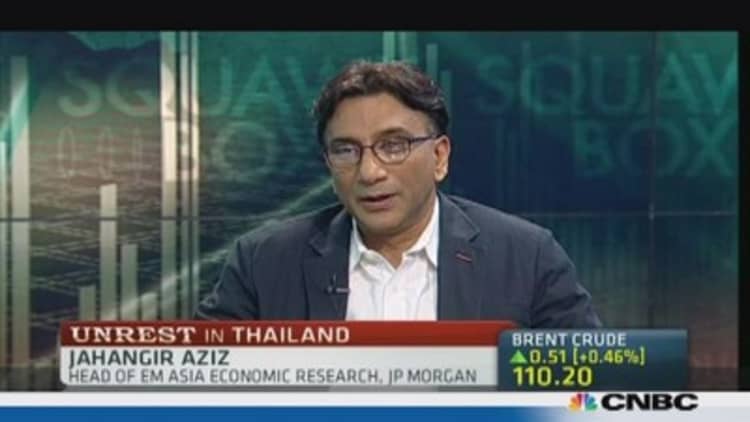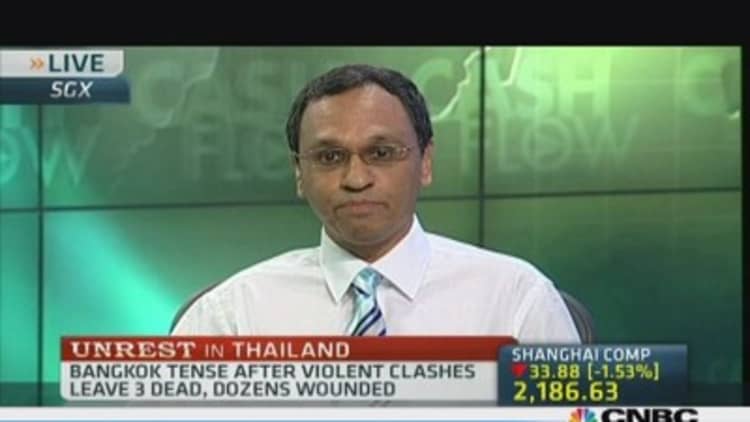As anti-government protests in Thailand turned violent over the weekend, analysts say the tensions have fully exposed the vulnerability of Southeast Asia's second largest economy.
On Sunday, 30,000 protesters launched a 'people's coup' on the Thai government, which led to violent clashes against the military, resulted in three deaths and forced Prime Minister Yingluck Shinawatra to flee a police compound.
Analysts told CNBC that the political conflict was exposing the already deep flaws in Thailand's economy.
(Read more: Spotlighton Thailand as political strife escalates)

"The entire economy is not doing well, so this doesn't help. The question is how long will it last? If it takes a long time to resolve then it could prove a drag on the economy," said Kelly Teoh, market strategist at trading firm IG.
Teoh added that the recent tension, which follows several other similar protests in the past decade, have brought the focus back to Thailand as a vulnerable economy.
(Read more: Thailand's investors spooked by 'forgiveness')
"Its stock exchange saw the largest outflow out of all of Asia in November at $1.5 billion. It's almost as if 2011, where the outflows were significant is happening again for Thailand," she said.
Thailand's stock market opened 1 percent lower on Monday before recovering some of its losses by mid-afternoon trade, following comments from the prime minister, who said she would "open every door" to pursue talks with protesters, Reuters reported.
Meanwhile the Thai baht, which had weakened to a near three-month low of 32.26 per dollar earlier in the day also pared back some losses. Many businesses in the nation's capital have been closed amid the protests.
Recent negative investor sentiment towards Thailand cannot be fully blamed on the political tensions, however. Thailand suffered sharp capital outflows amid the tapering panic earlier this year, prompting stocks to sell off around 28 percent from late May to late August, while deteriorating economic fundamentals have also put investors off.
(Read more: Political protests spook Thai central bank)
The economy unexpectedly slipped into recession in the second quarter, contracting 0.3 percent on the previous quarter, as exports and domestic demand faltered. The country is also running a current account deficit, leaving it exposed to the long-awaited tapering of the Federal Reserve's stimulus program.
Rajiv Biswas, Asia-Pacific chief economist at IHS Global Insight, told CNBC the political protests were already having an impact on Thailand's tourism industry, which accounts for around 7 percent of gross domestic product.
"A growing number of nations are issuing travel advisories warning their citizens not to travel to Bangkok, which remains a key hub for the tourism industry. The tourism sector, which had been growing strongly in 2012 and 2013, will face a serious setback if the political violence is protracted," he said.
"Not many people want to spend their Christmas holiday amidst riots and tear gas. I've recently cancelled my own Christmas holiday in Bangkok as a result of the political unrest," he added.

According to Nicholas Spiro, managing director of UK-based consultancy Spiro Sovereign Strategy, the recent violent protests have shown that Thailand is one of the most vulnerable emerging markets, even more so than India and Indonesia.
(Read more: No capital controls for Thailand: Finance Minister)
"Thailand has long been the political elephant in the room...Although it doesn't suffer from the severe balance of payments and inflationary pressures that plague India and Indonesia, nor the fiscal weaknesses that ail India and, to a lesser extent, Malaysia, Thailand still remains one of the most vulnerable emerging markets to a withdrawal of liquidity by the U.S. Federal Reserve," he added.
Spiro added that because Thailand has been one the biggest beneficiaries of capital inflows, as a result of a sharp rise in private credit and household debt in recent years, its economy would be at risk, even without the latest political unrest.
"[Thailand] is now experiencing something akin to a perfect storm: external vulnerabilities combined with growing idiosyncratic risks, with political instability taking center stage," he added.
(Read more: Embattled Thai PMeasily survives no-confidence vote)
However, other analysts pointed out if the current conflict blows over and economic conditions are returned to normal in a few months, Thailand's prospects could look much brighter.
"If there is an early resolution then everything will return to normal in a few months' time, we might even get a boost to the first quarter from all of this," said Jahangir Aziz, head of emerging markets Asia economic research at JP Morgan.
— By CNBC's Katie Holliday: Follow her on Twitter @hollidaykatie


